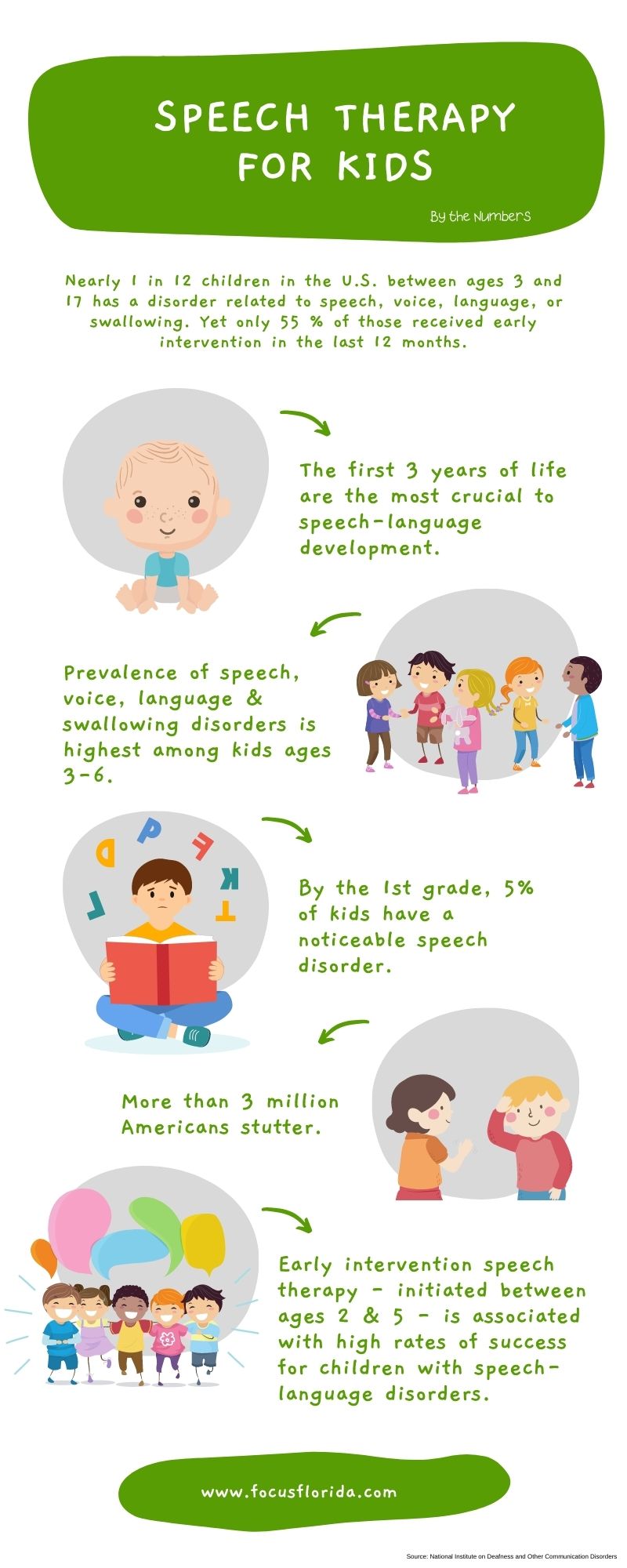Blog
Understanding ABA Therapy
Understanding ABA therapy is critical for anyone whose child has been recently diagnosed with Autism Spectrum Disorder, or ASD.
As our Fort Myers ABA therapy team can explain, ABA is short for “applied behavioral analysis,” and it involves utilizing the science of behavior to help children with autism in producing socially significant improvements in behavior. We apply proven behavioral science principles to increase or decrease targeted behaviors, with the ultimate goal of bringing about meaningful change to the child.
We work to identify behaviors that are observable and measurable, and then use empirically-validated, research-based strategies to help them make strides in overcoming challenging behaviors and increasing those that are helpful in daily life. We also teach and and help them practice critical life skills, such as social communication, emotional regulation, sensory integration, and executive functioning.
At FOCUS Therapy, we have two Fort Myers clinics where we provide both ADOS testing and ABA therapy for children in Southwest Florida.
FOCUS offers pediatric ABA therapy in Fort Myers and throughout Southwest Florida. Call (239) 313.5049 or Contact Us online.
Additional Resources:
What is Applied Behavior Analysis? June 23, 2021, Medically Reviewed by Jabeen Begum, WebMD
More Blog Entries:
Top 4 Benefits of In-Clinic ABA Therapy, April 4, 2022, Fort Myers ABA Therapy Blog
Why FOCUS Asks Parents to Stay in the Waiting Room During Evals, Sessions
FOCUS Therapy in Fort Myers conducts a range of in-depth evaluations for children who have been referred for speech, occupational, physical, or ABA therapies as well as ADOS testing. During our evaluations and therapy sessions, we rarely allow families to directly participate – but we have evidence-based reasons for our position.
During evaluations, we want to ensure every child receives an assessment that is as accurate as possible because that is what is going to allow us to:
- Determine whether the child needs therapy.
- Calculate the frequency/level of therapy that might be recommended.
- Make a strong case to the relevant insurer(s) about the medical necessity of the therapy.
Parents, when present in the room during FOCUS evaluations, can unwittingly stand in the way of those goals. Why? Mainly because children rely on their caregivers when things get tough – to help them, to comfort them, to make it better. When a child is struggling in a certain area, such as communication or independence with self-care skills, our clinicians need to independently observe the particulars.
Parent input is a key aspect of our evaluations, but we need to see for ourselves, too. Jennifer Voltz-Ronco, MS-CCC/SLP and FOCUS Therapy Owner/Founder, explained that when a child is accompanied by a parent during the direct observation portion of the assessment, parents often interfere without intending to do so or even realizing it.
“For example, in speech evaluations, parents might talk to the child or give clues to help their child ‘get the right answer’,” Voltz-Ronco explained. “We might ask the child to point to an object out of an array of 3-4 items by saying, ‘Show me the cup.’ Standardized testing requires that we be very specific in how we present these items – and with the requirement that we wait. And while we wait, we’re looking to see how long it takes them to process the directive and what they do. Will they look at us to see if we’re looking at the object? Will they point to it or make a face if they’re unsure? They might associate a cup to mealtime and instead point to a cookie. If the child looks to our face to get a clue, that would indicate social awareness and joint attention – key pre-linguistic communication skills. If there is a delay in their response, there may be an auditory processing issue. If they grab the first thing in reach, they may have impulsivity issues. Watching a child while they’re thinking tells us so much. But parents in the room might think the evaluator presumes the child doesn’t know the answer, so they interject. They say to the child, ‘You know what a cup is, like the blue sippie cup you have at home.’ Unfortunately, what that does is give the child numerous opportunities to hear the word, ‘cup,’ and in many standardized tests, we aren’t allowed to repeat the word or give a description or synonym. So with that, we lose the opportunity to see what we needed to see, and must in turn score the response incorrectly – which impacts the overall results.”
She went on to explain that often the key responses FOCUS therapists are looking for aren’t necessarily what an untrained observer may presume.
What’s more, some children can become what we call “prompt dependent.” That means the child looks to the parent to prompt them (to take an action, answer a question, etc.) – even if they don’t necessarily need the prompt. Many of our team members are parents ourselves, so we wholeheartedly understand how difficult it is to wait for your child to “do it themselves.” It is actually instinctual to intervene when we see or sense our child needs help. But during these evaluations, this intervention – however slight – can actually prove more of a hindrance when what we’re seeking are accurate results.
We DO Want Parents Involved in Their Child’s Therapy Journey
Although it is important for parents to remain outside the room during evaluations, this does not mean we lack transparency or that we don’t want parents involved at all in the therapy process. In fact, we get the best results from therapy when parents are fully engaged!
But we discourage direct engagement during the evaluation process and therapy sessions because we want to ensure our findings are accurate and that your child gets the true level of support they need.
While we want parents to be involved in consultation, goal-setting, education, and carryover, we strongly advise parents against sitting in during therapy sessions for the following reasons:
- Categorized: ABA Therapy, ADOS Testing, FOCUS News, Speech Therapy
- Tagged: ABA therapy, Bonita Springs ADOS testing, Bonita Springs speech therapy, Cape Coral ADOS testing, Fort Myers ABA Therapy, Fort Myers ADOS testing, Fort Myers kids speech therapy, Fort Myers speech therapy, Lehigh Acres ADOS testing, Lehigh Acres speech therapy, occupational therapy, physical therapy, Southwest Florida ADOS testing, Southwest Florida speech therapy, speech therapy
Top 4 Benefits of In-Clinic ABA Therapy
There’s more than one way to do ABA. Also known as Applied Behavior Analysis or behavior therapy, ABA therapy involves the study of behavior and the use of positive reinforcements to fade out unexpected/unhelpful behaviors and promote expected/helpful behaviors.
At FOCUS Therapy, we’re strong proponents of in-clinic ABA. There are many reasons for this, but it really boils down to the fact that: It works.
In fact, as we reported previously on our blog, a study published by the National Institute of Health revealed that when controlling for individual differences by analyzing the progress of the same kids but in different settings, those who received ABA therapy in-clinic demonstrated far higher rates of learning during treatment compared to in-home therapy services. The kids who received ABA therapy in-clinic mastered 100 percent more skills per hour than those who received home-based treatments.
Contact us online or by calling (239) 313-5049. FOCUS offers ABA therapy to kids at two clinics in Fort Myers, Florida.
- Categorized: ABA Therapy
- Tagged: ABA therapy, ABA therapy Fort Myers, Fort Myers ABA Therapy
Speech Therapy – by The Numbers
Although many parents are concerned when their child’s communication indicates a possible speech-language delay or disorder, the reality is speech therapy is one of the most common services available for young kids.
Sometimes, speech therapy helps resolve problems with articulation (how words are said). Other times, it helps with more complex neurological social-communication conditions like autism spectrum disorder. Lots of kids may also struggle with feeding/swallowing and voice issues.
With early intervention, many of these kids go on to thrive – and you would never know they had a deficit at all!
Contact us online or by calling (239) 313-5049. FOCUS offers pediatric therapy in Fort Myers and throughout Southwest Florida.
Additional Resources:
Be Tech Wise With a Toddler, American Speech-Language Hearing Association
- Categorized: Speech Therapy
- Tagged: Fort Myers speech therapy, pediatric speech therapy, speech therapy kids
At What Age Should My Child Start Speech Therapy?
Most parents know the thrill of hearing a child say, “mama” and “dada” for the first time. Then comes the adorable baby talk. But what if your child isn’t saying words by the time they’re 1 year old? What if they’re still mispronouncing lots of basic words by age 5? At what point do you decide a speech therapy consultation might be in order?
The first thing to bear in mind is that kids develop at all different paces. So the fact that your child is behind a bit isn’t necessarily cause for alarm. That said, it never hurts to have your child evaluated if you aren’t sure. FOCUS Therapy in Fort Myers offers free initial consultations to help parents determine if a more extensive evaluation is necessary. Evidence has shown time-and-again that “wait-and-see” is an ineffective approach when it comes to children with speech-language disorders or delays. The reason is the longer kids go without early intervention, the more developmental skills they must catch up on. Plus, the older they are, the harder it is to unlearn bad habits and adopt new ones because neuropathways have less plasticity as we age.
 “If there is reason to be concerned when your child is 18-months-old, there is no reason to wait until they’re 3 or 5 to have them evaluated,” explained FOCUS Therapy Owner/Founder Jennifer Voltz-Ronco, MS/CCC-SLP. “The earlier we can diagnose a speech-language disorder or delay, the less impact it is going to have on your child’s development, academic achievements, and social/emotional well-being.”
“If there is reason to be concerned when your child is 18-months-old, there is no reason to wait until they’re 3 or 5 to have them evaluated,” explained FOCUS Therapy Owner/Founder Jennifer Voltz-Ronco, MS/CCC-SLP. “The earlier we can diagnose a speech-language disorder or delay, the less impact it is going to have on your child’s development, academic achievements, and social/emotional well-being.”
Speech delays can have a number of causes, including oral impairment (problems with the tongue or palate), oral-motor problems, hearing issues, or a neurological condition like autism spectrum disorder (ASD). Although we treat children of all ages, we do recommend initiating assessments as early as possible, ideally as soon as you notice an issue.
Steps to Take if You’re Concerned Your Child Might Need Speech Therapy
If you think there’s a possibility your child might need speech therapy services, consider the following steps:
FOCUS Therapy Hires Therapists Who Genuinely Care
At FOCUS Therapy, we care that are therapists are skilled and knowledgeable about what they do – but also, that they genuinely care.
Pediatric speech therapy, occupational therapy, physical therapy, and ABA therapy – these are not fields you enter because they are easy or yield automatic results. They require therapists, children, and parents collaborating – day after day, week after week, month after month, and sometimes year after year – committed to helping kids develop key skills that will help them move, communicate, engage, and thrive. Achieving independence takes effort and commitment and patience – and therapists who truly care about these kids and their families.
FOCUS Therapy actively seeks to hire the kind of pediatric therapists whose love for their work and helping children shines in everything they do. It’s that passion and enthusiasm that not only make every session feel like “play time,” but help these kids reach their goals. And ultimately – that’s what it’s all about! We don’t want anything holding them back in life.
FOCUS offers pediatric speech therapy, occupational therapy, physical therapy, and ABA therapy at two clinics in Fort Myers. We also offer teletherapy services to children throughout Florida. Call (239) 313.5049 or Contact Us online.
- Categorized: FOCUS News
- Tagged: Focus Therapy
Our Favorite Sensory Gym Equipment for Kids With Disabilities & Delays
A sensory gym can be summed up in a single phrase: “Putting the FUN in FUNctional!”
If your child is beginning pediatric therapy (speech, occupational, physical, or ABA) at one of our two Fort Myers clinics, you’ve probably noticed some areas decorated with bright walls and packed with an array of Some of the equipment you see might look a lot like what you’ll observe in a playground or actual gym.
Although it may look like a bit of a free-for-all, a sensory gym is strategically designed to provide a structured environment to help children with delays and disabilities work on their sensory, motor, and communication skills.
- Categorized: Behavior Therapy, Occupational Therapy, Physical Therapy, Speech Therapy
- Tagged: FOCUS Therapy sensory gym, Fort Myers pediatric therapy, Fort Myers sensory gym, Fort Myers sensory gym equipment, pediatric occupational therapy Fort Myers, pediatric physical therapy Fort Myers, sensory gym Fort Myers, Southwest Florida sensory gym
How FOCUS Fort Myers Speech Therapists Teach Sound Articulation
Does your child struggle to say particular sounds? Do they say “fumb” for “thumb”? Say their ‘r’ sound like a ‘w’? Leave out a sound if it’s too hard to pronounce (i.e., ‘nana for ‘banana’)? Say their ‘s’ sounds with a lisp? As our Fort Myers speech therapists can explain, these are speech sound errors, which can be addressed with a type of speech therapy called articulation therapy.
We should start by saying that some articulation difficulty is 100% normal, and your child will grow out of it. The question will be how old they are and where they should be at developmentally for their age group.
In general:
- By 32 months, a child should be able to say the /p/, /h/, /b/, /m/, /n/ sounds.
- By 36 months, your child should be able to properly say the /f/, /w/, /b/, /g/, /d/ sounds and the “ng” sound.
- At 48 months, your child should be able to correctly say the /s/ sound.
Another element to consider is how well your child is generally understood by people other than you.
- By 2, your child should be about 65% intelligible (understood) to most listeners.
- By 3, your child should be about 80% intelligible to most listeners.
- By 4, your child should be very intelligible in connected speech. Sometimes people will describe it as, “talking like a little adult.”
Trouble with articulation is only considered a “disorder” when a sound that should have been acquired.
Florida Speech-Language Pathologists are in High Demand
- focustherapy
- Feb 05, 2022
- Comments: ( 2 )
Florida speech-language pathologists are in high-demand – at our Southwest Florida pediatric therapy clinic and elsewhere. Speech-language pathology (SLP) ranks as one of the most desirable – and fulfilling – careers out there. Not only do these professionals enjoy significant job stability, good compensation, and numerous opportunities for career advancement, they have a direct role in the tangible well-being of their patients – and that’s truly why most of us are drawn to this field.
We know that at FOCUS Therapy, watching a pediatric speech therapy session can seem a bit like you’re watching play time. (And don’t get us wrong – we do have A LOT of fun!) But there is actually a great deal of study and consideration that goes into tailoring each session to help the individual child reach their goals.
We find that for parents, it’s helpful to know exactly the kind of training and dedication these professionals take on to get to the point of being able to structure play-based therapy (the kind we find most effective when working with children).
What Exactly Do Florida Speech-Language Pathologists Do?
Speech-language pathologists are experts in communication, and can actually work with people of ages – from infants to the elderly. They treat many different kinds of issues related to communication and swallowing. Some of these include:
- Speech sounds. This is how we say sounds and put sounds together to form words. We sometimes refer to these as articulation or phonological disorders. They can also include dysarthria and apraxia of speech.
- Language. This is how well we understand what we hear or read and how we use words to tell others what we’re thinking. With adults, this is referred to as aphasia.
- Literacy. This refers to how well someone is able to read and write. Lots of people (especially children) with speech & language disorders may also have trouble reading, writing, and spelling.
- Social communication. This is how well someone is able to follow social rules, like talking to different people, how close you should stand to someone when you’re talking, and how to take turns in a conversation. Formally, this is referred to as pragmatics.
- Voice. This is how a voice sounds. One might talk through their nose, speak too loudly, lose their voice easily, sound hoarse, or struggle/be unable to make sounds at all.
- Fluency. Most people know this as “stuttering,” and it refers to how well speech flows. Lots of young children stutter, but many grow out of it. Those with persistent issues should consult with an SLP.
- Feeding and swallowing. This involves how a person chews, sucks, and swallows liquid and food. Poor nutrition can cause a host of health problems. Southwest Florida speech-language pathologists can help.
- Cognitive communication. A deficit in this area would involve problems with organization, attention, memory, problem-solving and other thinking skills.
 You can find speech-language pathologists in private pediatric practices like FOCUS Therapy, but they’re also employable at schools, hospitals, doctors’ offices, rehabilitation clinics, and colleges/universities.
You can find speech-language pathologists in private pediatric practices like FOCUS Therapy, but they’re also employable at schools, hospitals, doctors’ offices, rehabilitation clinics, and colleges/universities.
Steps to Becoming an SLP
The basic steps to becoming a speech-language pathologist in Florida are:
- Earning your bachelor’s degree in a related field. This is a four-year commitment. Two undergraduate degrees that many SLPs commonly earn are a Bachelor of Science in Communication Sciences and Disorders and a Bachelor of Science in Speech-Language Pathology and Audiology. These are ideal if you know early on you want to become a speech-language pathologist. But it’s not uncommon for people to switch majors a few years in. Other bachelor’s degrees that can be well-suited to a later career in speech-language pathology are education, linguistics, and psychology (particularly if you pair them with a minor in something like communication sciences and disorders.
Snow in Fort Myers? Check Out This Cool Occupational Therapy Activity!
South Florida may not have real snow like our northern neighbors (though there was that one time back in 1977), but this cool occupational therapy activity for kids is just as fun – no scarves or mittens required! 
Making fake snow is an excellent tactile activity that’s great for helping our pediatric OT patients practice important life skills. Kids can help with the scooping, measuring, pouring, and mixing ingredients – all of which helps with reach, grasp, and wrist rotation. It’s also great sensory engagement that can be tailored to help with critical thinking, social skills, and communication.
We opted to try it in a couple of our recent OT teletherapy sessions, but it’s easily replicated at our Fort Myers therapy clinics. We encourage parents to try it out at home for maximum carryover of important skills.
The cheap, easy-to-find ingredients needed for this faux snow craft are:
- Baking soda
- White hair conditioner
- A bowl or bin
- Some tin foil or newspaper to lay down (if you’re doing the project indoors)
Directions: Simply mix about 3 cups of baking soda with about 1/2 cup of white hair conditioner until it’s firm. (If you don’t have that much of either ingredient, just make sure you’re using quite a bit more of the dry baking soda than wet hair conditioner.) You can use a spoon or spatula, but we opted for the extra sensory input of mixing it by hand.
 Note that measurements don’t need to be exact. In fact, it might even help your child exercise their executive function skills if you don’t exactly measure it all out.
Note that measurements don’t need to be exact. In fact, it might even help your child exercise their executive function skills if you don’t exactly measure it all out.
“Let your child problem-solve by determining if they need to add more wet or dry ingredients to the batch,” said FOCUS Occupational Therapist Krystle Lopez. “You’ll know the snow is mixed correctly when you can pick it up and form snowballs. It will even be cool to the touch – just like real snow!”
It will last a while too if you put it in a sealed bag or bin.
Be prepared for a bit of mess – but a ton of fun!
How Making Fake Snow Helps With Pediatric Occupational Therapy Goals
 “It’s amazing how many skills can be targeted just with this simple ‘play’ activity,” Lopez said. “And I love that it’s something simple parents can do at home as well.”
“It’s amazing how many skills can be targeted just with this simple ‘play’ activity,” Lopez said. “And I love that it’s something simple parents can do at home as well.”










